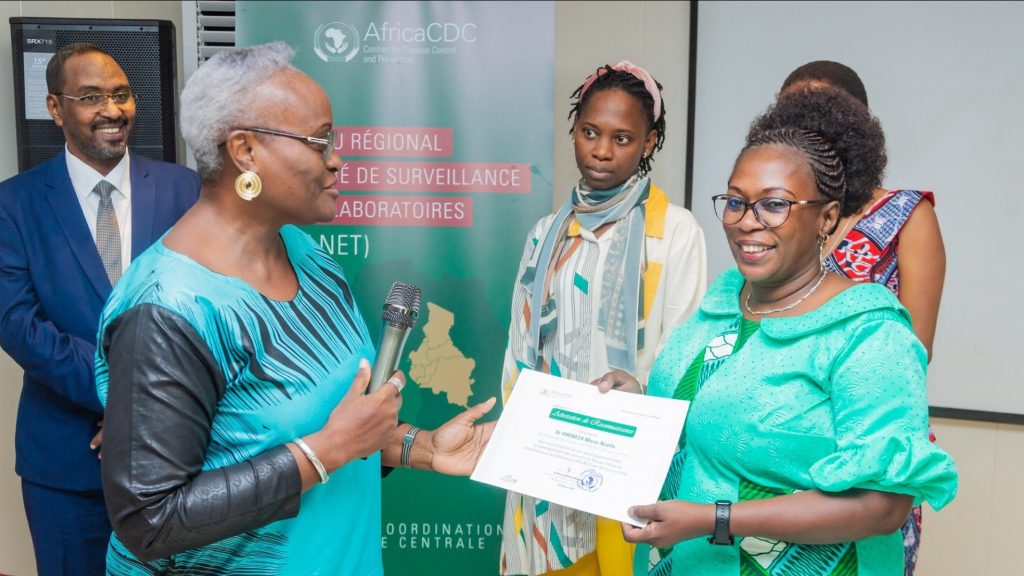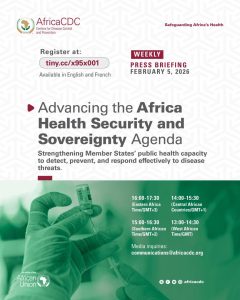The Central Africa Regional Laboratory and Surveillance Network (RISLNET) has appointed new office bearers to champion better health security in the region.
Member States appointed a new board, developed a clear roadmap, and adopted a new operating framework aligned with the strategic priorities of the Africa Centres for Disease Control and Prevention (Africa CDC) at a workshop in Libreville, Gabon, held from March 28–29, 2025.
For the next two years, the Democratic Republic of Congo (DRC) and Equatorial Guinea will serve as Chair and Vice-Chair of RISLNET Central Africa, respectively.
“For Africa CDC, a high-quality laboratory and surveillance system is crucial because of the burden of disease and the large number of epidemics that occur on the continent, and in our region,” said Dr. Brice Wilfried Bicaba, Director of Africa CDC’s Central Africa Regional Coordination Centre.
“A robust Integrated Laboratory and Surveillance Network (RISLNET) offers several strategic advantages, such as rapid detection and response to epidemics, improved coordination and communication, enhanced diagnostic capacity, real-time surveillance and trend analysis, and better integration with public health strategies,” said Dr. Bicaba.
RISLNET was established by Africa CDC to coordinate and integrate all public health laboratory, surveillance, and emergency response resources. The network aims to effectively support the prevention, early detection, and response to public health threats in Africa’s regions.
Over the course of two days, experts from the Central Africa network discussed regional emergencies, where almost 30% of Africa’s epidemics are declared each year, and shared initiatives to improve the detection, prevention, and response to epidemics through an integrated and coordinated approach.
RISLNET Central Africa’s new operating framework comprises seven strategic areas: strengthening surveillance systems; improving laboratory networks; data management and information sharing; capacity building; support for research and innovation in surveillance and diagnostics; emergency preparedness and response; and strengthening collaboration and coordination between the region’s Member States.
Thanks to the new restructuring, RISLNET Central Africa aims to become a benchmark in surveillance and diagnostics, thus contributing to Africa CDC’s objectives of a continent better prepared for health crises.
“Our objectives were achieved during this meeting. Our new operating framework will enable better synergy between surveillance systems and laboratories so that we can anticipate and respond effectively to health threats,” said Dr. Mourou Jean-Romain, Deputy Director General for Health Promotion in Gabon. “We would like to thank Africa CDC for their clear support for RISLNET Central Africa,” he added.
RISLNET had previously operated under terms of reference drafted when the network was established in 2018, but with Africa CDC’s new strategic plan, there was a need to realign and set new priorities accordingly.
The new board and framework come six years after the launch of RISLNET Central Africa in Brazzaville. The network has made major progress, including the training of 270 laboratory professionals, public health managers, and laboratory experts in the basic laboratory information system (BLIS), equipment maintenance, quality assurance, biosafety and biosecurity management, as well as sample transport and referral.
In addition, four laboratories in four countries (Burundi, Congo, São Tomé and Príncipe, and Chad) are benefiting from the CGB-BLIS facility, which improves sample turnaround times and supports clinical decision-making.
RISLNET is contributing to the current Mpox epidemic response through the development of continental and national standards and guidelines for the notification of Mpox cases. The capacity of 70 national epidemiologists, 38 surveillance focal points, and 64 agents at points of entry has been strengthened, and data managers have been deployed in the Democratic Republic of Congo (DRC). Forty thousand collection swabs, storage boxes, and transport bags, along with 74,000 RT-PCR test kits and sequencing reagents, have been distributed across the continent.
In the DRC, the number of laboratories able to screen for Mpox has increased from two to 12. Finally, 169 laboratory experts have been trained in biosafety, sample collection, and analysis, in addition to a regional training of trainers of 14 professionals from seven Member States in testing and sequencing.







